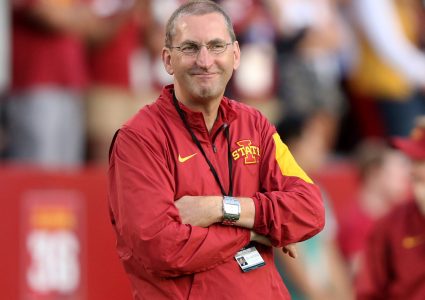Jack Trice Stadium is officially sold out for 2020 — sort of.
Iowa State athletic director Jamie Pollard announced in a letter to fans on Thursday that the school has sold all of the 30,000 tickets, roughly 50 percent of the stadium’s capacity, made available to fans wanting to attend football games this fall as part of the efforts to continue mitigation of the COVID-19 pandemic.
That news came in addition to the Pollard announcing Iowa State has tested all 160 football players and staff members for the illness with just four tests coming back positive since their return to campus earlier this month.
“The diligent commitment to safety by our medical and football coaching staffs has been instrumental to our low numbers,” Pollard wrote. “The next hurdle will be when the football team begins team activities on July 13.”
Thursday’s letter also added further clarity to Iowa State’s plans for what fans in Jack Trice Stadium will look like in 2020. Besides the limited seating capacity, fans will be required to wear face coverings to enter the stadium, parking space time for tailgating will be reduced, all tickets will be digital, additional hand sanitizer stations will be installed plus concession and entrance protocols will be changed.
Pollard said fans can expect to see a complete list of changes for the 2020 season as the Sept. 5 season opener against South Dakota gets closer.
“The safety of all participants and fans remains the top priority and that is why such thorough and comprehensive mitigation plans are being vetted for all of our venues,” Pollard said. “As we previously shared, attempts to implement mitigation strategies to a standard of absolute protection is simply not reasonable. It will ultimately be up to each attendee to decide if they are comfortable attending games given the mitigation strategies we implement.”
Pollard’s letter comes just three days after the Story County Board of Health released a statement urging Iowa State to cancel having fans in the stands at events this fall. Story County has seen an increase of 471 total cases of COVID-19 since June 1.
“Although athletics events will have significantly reduced capacities this year, we hope to continue to be a significant economic engine for our community and state,” Pollard said. “We recognize that our athletics events play a significant role in the economic well-being of many businesses and residents. That is a responsibility we do not take lightly.”





